Strategic Thought Transformation - The IIPM Think Tank
Strategic Thought Transformation - The IIPM Think Tank
Strategic Thought Transformation - The IIPM Think Tank
Create successful ePaper yourself
Turn your PDF publications into a flip-book with our unique Google optimized e-Paper software.
M U T U A L F U N D S<br />
Though it might seem extreme, some mutual fund managers<br />
are clearly uneducated. An educated mutual fund<br />
manager can make all the difference in your portfolio<br />
Professor Aron A. Gottesman,<br />
Lubin School of Business, Pace University, New York<br />
<strong>The</strong> mutual fund industry in India is<br />
booming. According to a recent Wall<br />
Street Journal report, the industry<br />
has nearly doubled in size over the past<br />
three years, with approximately $48 billion<br />
US under management. With numerous<br />
firms in the Indian mutual fund industry,<br />
each offering different funds, the Indian<br />
investor has an unprecedented opportunity<br />
to grow their portfolios and reap<br />
the benefits of India’s explosive economic<br />
growth. At the same time, however, mutual<br />
fund investors face a bewildering array of<br />
marketing claims and fund characteristics.<br />
Investors must navigate treacherous waters<br />
when deciding on which mutual funds to<br />
invest - and which to avoid.<br />
Unfortunately, when selecting a mutual<br />
fund, some investors don’t act very wisely.<br />
Instead of investigating their choices thoroughly,<br />
they rely on tips, rumors, news<br />
headlines, or marketing material provided<br />
by the mutual fund. <strong>The</strong> willingness of<br />
many to use this approach is likely driven<br />
by the confusion that investors experience<br />
when choosing a fund; with all of noise<br />
that the fund-industry creates, many find<br />
it difficult to differentiate between highand<br />
low-quality funds, and rely on rumors<br />
and advertisements instead. This approach,<br />
admittedly, has the benefit of not requiring<br />
the investor to expend much effort. But it<br />
doesn’t seem to be a particularly sophisticated<br />
investment approach.<br />
What’s the alternative This is a question<br />
that academic finance researchers<br />
have explored for decades, through scrutinizing<br />
past mutual fund performance to<br />
determine the factors that make a mutual<br />
fund attractive. This research, which uses<br />
Mutual fund<br />
managers face the<br />
daunting task of<br />
earning superior<br />
returns in a highly<br />
competitive<br />
environment<br />
proven statistical methods and is published<br />
in reputable finance journals, typically identifies<br />
factors that are observable to investors<br />
at the beginning of a predefined time<br />
period, and examines if investments made<br />
on the basis of these factors are related to<br />
the subsequent return performance. For example,<br />
researchers have found that funds<br />
with lower expenses outperform funds with<br />
higher expenses; that passively managed<br />
index funds outperform actively managed<br />
funds; that funds with higher turnover outperform<br />
funds with low turnover; and that<br />
performance may be related to fund ratings,<br />
among other factors. While fund performance<br />
can never be predicted with certainty,<br />
these studies provide guidance that a serious<br />
investor would be foolish to ignore.<br />
In this article, I will focus on one mutual<br />
fund performance factor that has only<br />
recently begun to receive attention by researchers:<br />
the quality of the mutual fund<br />
manager’s education.<br />
Does manager education make<br />
a mutual fund attractive<br />
Mutual fund managers face the daunting<br />
task of earning superior returns in a<br />
highly competitive environment. <strong>The</strong>ir<br />
performance is closely scrutinized by investors,<br />
their superiors, other managers,<br />
and the press. Measures of mutual fund<br />
performance are adjusted for risk and are<br />
easily comparable; hence any failure relative<br />
to the selected benchmarks is quickly<br />
identified and critiqued. “Superstars” are<br />
celebrated, while those that fail to meet<br />
expectations find their careers wounded.<br />
But what makes one manager a superstar<br />
and another a failure Successful<br />
managers may have a natural talent<br />
for investing, while others benefit from<br />
working for a well run mutual fund company.<br />
Some would argue that luck plays<br />
an important role. But beyond natural<br />
talent and luck, another obvious factor to<br />
consider is whether the manager’s education<br />
plays a role in performance. In other<br />
words, can one learn how to be a good<br />
mutual fund manager, or are these skills<br />
unteachable<br />
Many mutual fund managers are certainly<br />
highly educated, with more than half<br />
holding a Master of Business Administration<br />
(MBA) degree, approximately half holding<br />
the Chartered Financial Analyst (CFA) designation,<br />
and approximately one third holding<br />
other graduate degrees. Among managers<br />
holding MBAs, approximately 40% hold<br />
MBAs from top-tier business schools. Does<br />
all of this education make a difference<br />
STRATEGIC INNOVATORS



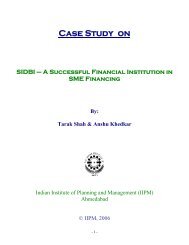
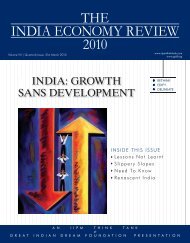
![[Feb 2008, Volume V Annual Issue] Pdf File size - The IIPM Think Tank](https://img.yumpu.com/43961117/1/190x245/feb-2008-volume-v-annual-issue-pdf-file-size-the-iipm-think-tank.jpg?quality=85)
![[June 2008, Volume V Quarterly Issue] Pdf File size - The IIPM Think ...](https://img.yumpu.com/41693247/1/190x245/june-2008-volume-v-quarterly-issue-pdf-file-size-the-iipm-think-.jpg?quality=85)

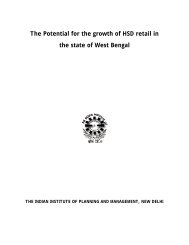
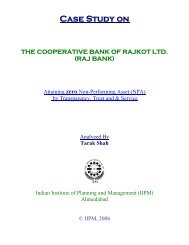

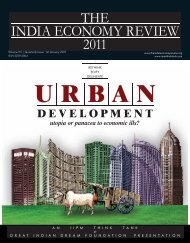
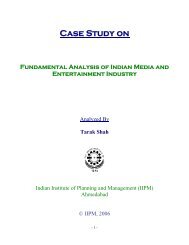
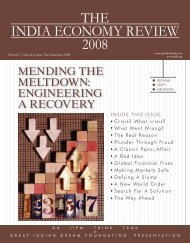
![[Dec 2007, Volume 4 Quarterly Issue] Pdf File size - The IIPM Think ...](https://img.yumpu.com/29766298/1/190x245/dec-2007-volume-4-quarterly-issue-pdf-file-size-the-iipm-think-.jpg?quality=85)
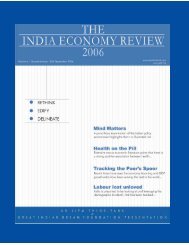
![[Volume VI | Quarterly Issue: 31st May 2009] Pdf File size](https://img.yumpu.com/27796051/1/190x245/volume-vi-quarterly-issue-31st-may-2009-pdf-file-size.jpg?quality=85)